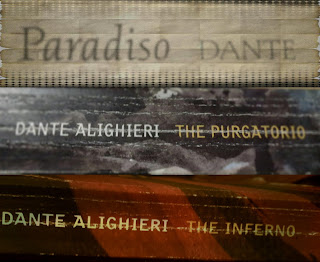081712. friday.
hi there! HAHA. if ever you noticed, many
of my posts lately are about the recent books i’ve read. spare me the
blame ‘coz i haven’t been doing anything else aside from reading. i’m too broke
to go out often and squander money! HAHA. well, hope this doesn’t bore you. :)
time for this blogpost’s subject.
i had to make some adjustments since this
Paradiso came from a collection(Bantam Classics) different from where the first
two(Signet Classics) were taken. unlike the first two books, this doesn’t have
a longer and more comprehensive introduction which i found very helpful when i
read Inferno and Purgatorio. Paradiso was more challenging to me since i had to
depend on the poem and the notes solely. this time i’d really know whether or
not i have a mind capable of understanding
poetry. HAHA.
the final ascent of Dante, the
culmination of all that he’s been through is found in Paradiso.
what the last part of The Divine Comedy
contains is quite different from what i expected. i thought there’d be no more
voyage. then again, the whole story revolved
on Dante’s journey to the top, but that, according to his narration, there
really are no lower or higher points here. this is the case only because this
is as far as human-like capacity is able to grasp. everyone is equal in heaven,
and that wherever an angel/seraphim/cherubim can
be is where that being wished to be. and because
the phenomena here are
not something human can easily perceive, Dante has had more questions compared with Inferno and Purgatorio. and as a reader, i was even
more confused. HAHA.
Paradiso follows the same pattern as the
first two - exploration of different stages, accounts of stories from notable
beings, Dante’s comprehension of the many puzzles.
for me, the moving parts were found in the last chapters of the book only,
when he’s already in the Empyrean where all the beatified and blessed are truly
placed, together with Mary and God.
 |
| this is an illustration (provided by the book) of how Dante perceived the universe in the epic poem. |
as a whole,
i guess the The Divine Comedy has become too complex and too serious that i
didn’t find anything astonishing about it. not that it’s not good, it is great
actually. it’s just that these books(Inferno, Purgatorio and Paradiso) are less
on emotions, more on details and reasons. the many clarifications took over the
whole story. i don’t know with other people, but
that’s how i see it. HAHA.
nonetheless, there are still a lot of
essential lessons that can be extracted from what i’ve read. here, it was all
about contentment and achievement of desire. i also mentioned some lessons in
my posts about Inferno and Purgatorio.
the learning is what made the reading worth it. :)
again, THANK YOU for the books, ate delee! HAHA.



.jpg)



who translated this one? point well made shug. i wonder when i'be able to catch up. i hope to see you soon and borrow those. :)
ReplyDeleteallen mendelbaum. i don't know him really. encountered him only in this book. haha! always willing to lend you what's mine. HAHA!
ReplyDeletei know that man, and thank you.
ReplyDelete